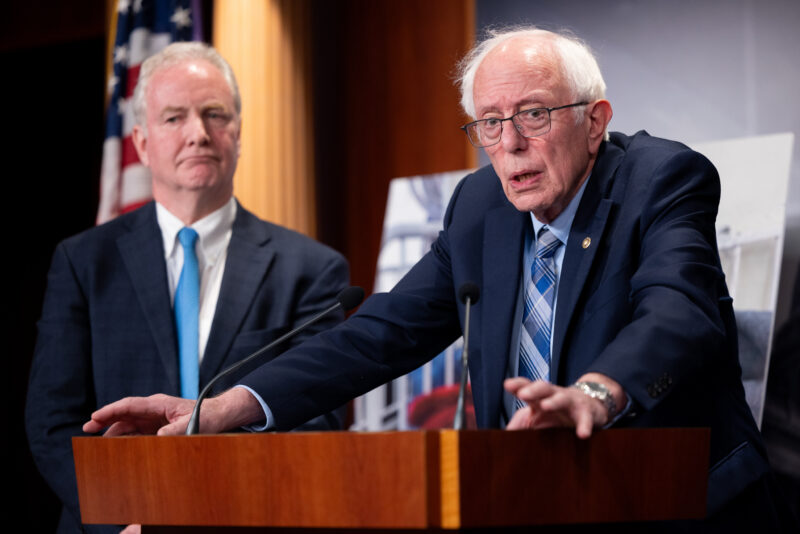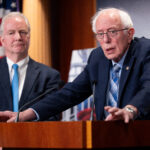Following Middle East trip, Mullin endorses ‘aggressive’ and ‘proactive’ Israeli response to terror threats
The newly minted senator from Oklahoma visited the region amid heightened tensions

Photo by Drew Angerer/Getty Images
Rep. Markwayne Mullin (R-OK) speaks during a news conference with members of the House Intelligence Committee at the U.S. Capitol August 12, 2022 in Washington, DC.
Returning from a trip to Israel, the United Arab Emirates and Saudi Arabia at a time of heightened tension in Israel and the Palestinian territories, Sen. Markwayne Mullin (R-OK) endorsed an “aggressive” response by Israel to Palestinian terror threats, telling Jewish Insider that “there’s no point in them just reacting every time, sometimes you have to be proactive.”
Mullin, a former House member elected to the Senate in November, visited the region with several Senate GOP colleagues in mid-February on a trip led by Senate Minority Leader Mitch McConnell (R-KY). He offered a generally optimistic view of progress in the region brought about by the Abraham Accords, while also warning about fading confidence in the U.S. as a reliable partner.
The group traveled to Israel at a time of significant upheaval — Palestinian terrorist attacks targeted Israelis during the visit, and a group of Israeli settlers raided the Palestinian village of Huwara at the end of the visit.
Mullin emphasized that “Israel isn’t the one provoking this, but they had a right to defend themselves and be aggressive if they’re attacked.”
“They don’t have to always be on the defense. I think if you would leave it up to Israel, you wouldn’t have the attacks you’re having right now,” he continued. “There’s no point in them just reacting every time — sometimes you have to be proactive. And so if people want true peace, it’s two-sided.”
That’s a significantly different view of the situation than the one laid out by Sen. Peter Welch (D-VT), who visited Israel the same week as Mullin with a group led by Senate Majority Leader Chuck Schumer (D-NY). Welch offered a pessimistic view of the security situation and urged deescalation, particularly criticizing Israeli moves toward settlement expansion as curtailing the possibilities for peace.
Although Israel’s plans for expanding West Bank settlements have attracted controversy on the global stage, including from the UAE — which proposed but ultimately canceled plans for a United Nations vote on the settlement plans — Mullin said they were not a prime area of discussion during the visit. The UAE “didn’t mention a whole lot [about] it,” Saudi Arabia “didn’t even bring it up” and in Israel “it was brought up a little bit,” Mullin said.
The Oklahoma senator said he does not have any personal opinion — “It’s not my backyard, it’s not where I live and I’m not going to tell Israel how to run their country,” he said.
Mullin and McConnell were joined on the trip by Sens. Thom Tillis (R-NC), Ted Budd (R-NC), Joni Ernst (R-IA), Katie Britt (R-AL) and Pete Ricketts (R-NE).
The Oklahoma senator indicated that the group’s discussions in Arab states reflected a growing weariness with the Palestinian cause among Arab leaders.
“I think people are growing fatigued by it,” he said. “Because you can only cry wolf so many times before people get tired of it.”
Mullin noted that Israel, Saudi Arabia and the UAE and other Arab states have flourishing economies, in comparison to the continuing struggles in the Palestinian territories. Mullin laid the blame for this situation on the Palestinians — ”one [the Palestinians] always wants to be the victim, and the other one [the Israelis] is trying to move forward.”
The group was scheduled to have a meeting with Palestinian leadership, but the PA canceled it, Mullin said.
The group’s visit also coincides with ongoing debate in Israel and globally about proposals from the Israeli government for reforming the country’s judiciary — a subject Mullin said was “brought up in every meeting we had” with both Israeli government officials and business leaders.
Mullin recounted that his takeaway from the discussions was that “they all were in agree[ment] that it needed to be done” and that debates largely revolved around the “timing” and sequencing of the reforms.
“Some people wanted to rip the Band-Aid off and do it. But I think the overall view was that they wanted to get it right,” he said.
Leaders from outside Israel likewise weighed in on the issue, telling the group “that they wanted to make sure that it was done right because they are truly a democracy… A lot of them look at that and say ‘Listen, they’re the only democracy that really works around here,’” according to Mullin.
Mullin told JI that the “biggest thing that,” across the delegation’s meetings in all three countries, “came up over and over again was the Abraham Accords,”
“The Abraham Accord[s] [have] broke[n] down barriers for economic purposes, but it also brought together their ability to work with their military and openly discuss their common enemy, which is Iran,” Mullin said.
The senator, who serves on the Senate Armed Services Committee, said, however, that discussions around the normalization agreements were linked to regional anxiety about the U.S.’s withdrawal from Afghanistan, which Mullin said had engendered “fear” that “there’s no guarantee at all that we would be there for them.” Mullin has been a vocal critic of the U.S.’s pullout from Afghanistan, most notably attempting to enter Afghanistan amid the Taliban’s takeover to help Americans stranded in the country.
He said that, in spite of this “weakness that is perceived [in] the current American administration,” regional leaders said they now “have been able to feel confident that we have true allies and partners in our region, which we hadn’t had before.”
The Oklahoma senator said that the U.S. needs to “pay more attention” to the Middle East, highlighting in particular concerns in the UAE about what leaders there characterized as the slow American response to an attack in early 2021 by Iran-backed Houthi militants that killed three in Abu Dhabi. Fellow senators who visited the region earlier this year recounted similar discussions.
He linked these concerns to a broader fear of “us pulling away from that region” in the wake of the Afghanistan pullout, emphasizing that lawmakers need to work on building better relationships in the region or risk allowing China to gain a greater foothold.
Mullin offered a similar assessment of Israeli hopes for full normalization with Saudi Arabia as other lawmakers who have visited the region recently — ”they would have it done tomorrow if they could” — but noted that the subject is more complicated from the Saudi side.
“There’s a lot of political and entrenched ideologies that [have] to be addressed,” he said. “And it’s not that simple. I think if you really talk to the movers and shakers of Saudi Arabia, they would like to move forward with it. But it’s a very, very, very delicate situation.”
Saudi Arabia, he said, is “just turning that page” toward greater diversity in its society and has made “some outstanding and remarkable progress in just a very short period of time.”
Mullin laid out a gradual path toward normalization through greater economic and military ties, particularly as Israel and Saudi Arabia align their efforts to counter Iran. The benefits of these increasing ties will help gain increased acceptance for full normalization, he argued.
“I do believe it will happen, but it has to happen slowly and the timing has to be right,” he said. “You can’t force this.”













































